- Home
- Chevy Stevens
Dark Roads Page 3
Dark Roads Read online
Page 3
Beside the photo of me and Dad, there was one of my parents on their wedding day, the silver frame engraved with their names and the date. Finn & Rachel McBride. Two Become One. Dad looked young in his suit, only twenty-three, his usually wild hair neatly trimmed and slicked back, my mom smiling up at him, all raven tresses and white skin, her dress with belled sleeves. An ethereal fairy creature who had somehow fallen in love with an awkward Irish lumberjack.
I glanced at my mom’s paintings displayed around the room, pretty landscapes, all local scenery. When I was ready, I’d ask Lana if we could put my mom’s artwork and some of the household stuff in storage. It was hard to think of a day when I’d have my own place. What would it be like with no parents? My future was a long bridge hanging over a dark hole.
I sat cross-legged on the floor in front of the fireplace, where I used to sprawl with my iPad or watch TV while I waited for Dad to come home, listening for the crunch of his tires on the gravel, the slam of his truck door. I closed my eyes, imagined him walking in, excited to tell me about something he’d seen in the woods, a black bear, a new trail, a good fishing spot.
Why were you driving so fast on the logging road, Dad? You knew it was dangerous. We had plans. You and me against the world. That’s what you said. Losing Mom to cancer was supposed to be the worst thing I ever had to go through, but now you’re gone too, and I don’t know how I am going to make it. Why didn’t you get the will changed? How could you leave me with him?
I waited. Maybe there’d be a knock, a mysterious cold breeze. People talked about that. How they got messages from family or friends after they died. But the house stayed silent.
* * *
The shop was behind the house, in what used to be a storage building for the orchard. Dad had put windows in and insulated it, added a workbench. He’d said that every man needed a wolf den. His throwing knives, four of them, were still stuck in the target. I tugged them out and got into position. I was wearing a tank top, so my biceps were able to flex smoothly. I held my breath, then released the knife. My goal was to cut a piece of twine. I’d nicked a corner. Not good enough. Back in position, I raised my arm, but a knock on the side window startled me and the throw went wild. The knife hit the wall. Jonny made a face at me through the glass.
I opened the door. “Took you long enough.”
“Had to make a stop.” He pulled up a stool beside the workbench and reached down for the glasses and the whiskey we’d hidden behind the old paint cans. He poured us each a splash and we clinked our glasses. Dad’s last bottle.
I leaned against the bench and studied the target, the frayed piece of twine.
Jonny followed my gaze. “Your ninja moves need some work.”
“You’re just jealous because your aim is shit.” I swished some of the whiskey through my teeth like I’d seen Dad do sometimes. I felt him even more in the shop. His tools were still on the bench, his crossbow and fishing rods hanging over the gun safe, his hip waders and outdoor coats on their hooks by the door. His quad was still caked with mud from his last ride.
“Did you sign up for the race?”
“Yeah.”
“That track has a lot of sand on it, so keep your weight back.” Jonny was fast and daring—the bike floated when he came off a jump, his legs in the air behind him, one hand gripping his seat. He just needed to win a few more events, get a sponsor, and he could turn pro.
He nodded. “Let’s go to the pit next weekend.”
“Okay.” I looked at my dirt bike leaning on its kickstand. “I want to ride up to the silver mine one day too, but I can’t go anywhere until we fix my bike.” Dad knew everything about the mountains around there, but he never showed anyone except me how to find the old miner’s cabin. So deep in the forest, so hushed and quiet, it was like being in another world.
“Your wish is my command.” Jonny pulled a newspaper-wrapped bundle from his backpack, lifted it into the air like a trophy.
“You got the carburetor! Was anyone at the farm?”
“Just the dogs. I almost got bit!” He laughed.
“I told you to use smoked salmon. Did you see the puppies?” I took the carburetor from him, checked it over. For months I’d been slipping into Cooper’s barn at night, visiting with the dogs and playing with the mom, a pretty border collie. She was due a couple of weeks ago. I’d wanted to buy one of the puppies for Dad’s birthday, but Cooper kept raising the price.
“They’re cute. You want to sneak over and look?”
I shook my head. “We need to lie low. Vaughn busted me last night. He pulled right up beside me and just about gave me a heart attack.”
“Holy shit.” His eyes widened, pools of blue in his tanned face.
“Yeah, and he knows about the thefts. He was talking about you.”
We hadn’t meant to become thieves, but bikes were expensive. It took me two summers working with Dad to pay for half of my Honda CRF 150, and Jonny fixed everyone’s bikes and lawn mowers to get his 250. We were always needing parts and gas. We hit the rich people, the people we didn’t like. We weren’t short of targets. There were a lot of jerks in Cold Creek.
“The Iceman.” Jonny drew the words out long and slow. He was thinking about last fall, when Vaughn caught him riding his dirt bike on the paved roads. He was only crossing a short section, but Vaughn still impounded his bike, and made him walk home carrying all his gear.
“If you have anything on the property, get rid of it.”
“Yeah, okay.” He frowned. “What else did he say?”
“He was lecturing me about how I dressed, and he was staring at my shorts. Right here.” I spread my hand across my thigh.
“You think he was creeping on you?”
I pulled the knife out of the wall, remembering how Vaughn had looked at my legs. “More like he was warning me. But now I can’t go to the lake without him or Lana.”
“That is so messed up. What was he even doing out there?”
“That’s the strange part. He said he got a call about a domestic. Then he told me that we could keep it between ourselves, but I think he didn’t want Lana to know he wasn’t at the Moose Lodge meeting. Swear to God I could smell perfume in his truck.”
“He’s cheating on her.”
“Maybe.” I spun the knife, like how Dad taught me, the silver flashing. The knife soared end over end, stabbed in dead center. I walked over and tugged the knife free from the target.
“Are you going to tell her?”
“I don’t have any proof.” I shrugged, thinking of Vaughn’s other warning. “I don’t want to cause problems. I’m going to keep my mouth shut.”
Jonny looked thoughtful. “You could try to catch him.”
“Hell, no. I’m staying out of this—and you are too.” I pointed the knife at him. “You going to help me fix this dirt bike or what?”
I grabbed Dad’s toolbox without waiting for Jonny to reply, slid to my knees in front of my bike, and began unbolting the old carburetor. A moment later I felt Jonny beside me.
The first time we’d worked on a dirt bike together, I was eight years old and our dads were talking in our driveway—Jonny and his dad had come to get deer sausages. Jonny was a shy, skinny kid, wearing hand-me-downs from his brothers. Nothing ever fit right. He was a grade ahead of me, but I knew who he was, saw him sitting by himself at recess or following his brothers around. I’d been trying to tighten the chain on my dirt bike and sensed he was watching me. After a few minutes of his feet scuffing the gravel as he slowly moved closer, he’d crouched near my tire.
“What are you doing?”
“Don’t you know anything about bikes?”
He’d shrugged. “I know about tractors.”
“Grab a wrench.”
He’d glanced at his dad, and in a low voice said, “You got snacks?” So I’d raided our fridge, then showed him how to change the spark plugs, clean the chain and the air filter. He started coming over after school, on weekends, and I taught him
to ride. Soon he was better than me.
Junior high, he got taller, stronger, and gained a reputation for kicking anyone’s butt if they teased me. Girls decided they liked his blue eyes and dark eyelashes, his tanned skin, and his cheeky sense of humor. Everyone admired him for his daring on the racetrack. He had lots of friends, but I still kept to myself. We spent all our weekends together. It was like at school he felt he had to be cool Jonny, but with me he could talk about how his brothers were giving him a hard time, or how his family was having money problems. We shared our dreams. I was going to have a log cabin on a lake, my own dog. Jonny was going to race all over the world. No one would stop us.
I wanted it to still be true.
CHAPTER 3
Mason’s Diner smelled like burgers and homemade bread, bacon frying in a skillet. It was perfect, and painful. Dad and I went for lunch at the diner at least once a week. Sometimes he’d pull me out of school for the rest of the afternoon so we could take the canoe and catch the evening bite. Come on, you need a break. Let’s go get some fresh air in our lungs. There wasn’t much of anything that Dad didn’t think could be fixed by spending time in the woods.
I thought the diner would be slow on a Wednesday, but most of the tables and booths were filled with loggers, road crews, construction workers. Then there were the truckers, their caps and shirts emblazoned with company names. Johnson Hauling, A&D Transport, Northern Freight. One of the stools at the counter was free.
I slid into the open spot between a couple of old guys. Amber noticed me right away and paused beside my shoulder, menus under her arm.
“Hey! You staying for lunch?”
“Maybe.” I hadn’t planned on it until I saw her. Usually she worked the night shift. Her white peasant blouse gaped to show smooth, tanned skin, layers of dangling necklaces. She smelled like coconut lotion and looked like a folk singer with her long, cherry-colored hair, a nose ring, no makeup around her bright blue eyes. Beaded earrings. She’d been at the diner for a couple of months, but I didn’t know her whole story—she wasn’t from around here.
“Is Mason working?”
“Of course. That man doesn’t miss a day.” She rolled her eyes. “He’s in the stockroom, but he’ll be out in a minute. I better go help this table.” I watched from the side as she walked away, her faded jeans loose and sitting low on her hips.
Mason came out wiping his hands on a towel. “Haywire, nice to see you.”
“You too.” I relaxed a little. He’d used my nickname, the one he’d given me after watching me ride my dirt bike at the track. Mason might be a retired logger and rumored to have been in a biker gang at one time—he rode a sweet Harley—but he was more like my favorite uncle. Salt-and-pepper hair, a beard streaked gray, and serious brown eyes that made me feel like he was really listening when I talked. When he bought the diner a couple of years ago, he asked Dad to tell him the history of each black-and-white photo on the walls. There was even a shot of the miner’s cabin. I thought it was cool that Mason didn’t rip out all the old décor.
“What’s this?” Mason pointed at the envelope I’d set on the counter.
“My résumé. I don’t have much experience, but I’m a quick learner.”
“I could use a hard worker for the summer.” He picked up the envelope and slid my résumé out. I was about to tell him that I was willing to take any position—dishwasher, cook, waitress—but he’d turned toward the door, his shoulders stiff, the friendly smile gone.
“Afternoon, Officers.”
I snapped my head around. Vaughn had walked in with another cop. Constable Thompson. Younger than Vaughn. Maybe thirty? Tall, with tidy dark hair, clean-shaven, and the only First Nations cop in town. He’d arrived at the beginning of last summer and a lot of people thought it was to ease tension because of the highway, but it just got worse after the last victim was discovered. Her mom was First Nations, their family well known and liked. Thompson seemed okay. He’d shown up at a few parties, even the racetrack once or twice, but he didn’t hassle anyone.
I got to my feet. Too late. Vaughn was already coming over while Thompson found a table. Vaughn glanced at the résumé in Mason’s hand.
“Looking for a job?”
“Yeah, but I should get going. Lana needs help.” I grabbed up my wallet, turned to Mason with a polite smile. “My cell number is on my résumé. I can start anytime.”
“Okay, kid. I’ll be in touch.”
“Awesome.” I began to move away, when Vaughn’s hand clamped down on my shoulder.
“It’s a hot day. I’ll give you a lift.”
“I’ve got my bike and—”
“We’ll put it in the back.” He turned to the other cop. “Coffee another time, Thompson?”
“No problem.” The cop gave me a polite smile. Amber was at his table, leaning against the side of the booth, her head dipping toward him as he asked about something on the menu. Mason had moved to the cash register. No one noticed that Vaughn’s hand was still on my shoulder, his thumb pressing against my neck as he guided me toward the front door.
Then I saw her—a girl from my school. Our eyes met. Her name slipped through. Emily. Black hair, pixie cut, lots of dark makeup, a ring in her lip. She’d left school early, something about drug dealing. Her gaze lifted from me to Vaughn, settled on his hand on my neck. Her eyes went blank and her mouth flattened like ice spreading across a lake.
She shifted toward the old couple at her table, hiding her face. I didn’t get a chance to see if Vaughn had noticed; we were already at the door, and he was pushing me through.
Now we were at the truck. He nodded at the passenger door, unlocking it with a remote key. I climbed in and sat stiff in the front seat while he threw my bike into the back.
The girl watched out the window as Vaughn drove away with me.
* * *
He hummed along with the radio, his hand loose on the wheel, sunglasses covering his eyes as he guided the truck through town. He was acting calm, but the air in the cab felt thick, even with the air-conditioning going full blast. Was he still pissed about picking me up Saturday night? He’d been working the last few days, so I only had to see him at dinner, when Lana was home.
I sat pressed against the door, waiting for another lecture and wondering if this was going to be my whole summer, riding around with Vaughn in his truck. As the minutes passed, I started to relax. Then he switched off the radio.
Vaughn glanced at his phone on the mount, tapped out something with one finger. “We have to make a run out to the lake. Possible squatter near the cabins.”
The lake was twenty minutes out of town. I’d be stuck with him for nearly an hour before we got back. “I was going to help Lana with chores.”
“You want to be an outdoor guide, right? Like your dad?”
I frowned. It wasn’t a secret—everyone knew I helped Dad—but I didn’t understand why Vaughn was bringing it up, and I didn’t like that hollow dizzy feeling I got when I remembered me and Dad talking about the future, designing our logo, imagining a website.
“You ever consider becoming a conservation officer? Better money. You’ll go on calls like this, catching poachers, off-season hunters. This will be good experience for you.”
“Lana is expecting me, and—”
“Text her.” He turned his head toward me, dark sunglasses covering his eyes. “Never mind, I’ll do it.” He lifted his phone, pressed the keypad with one hand. I wanted to call him out for breaking the distracted-driving laws, but the less we interacted, the better. The message whooshed. He was driving so fast we were already at the outskirts of town.
“Listen, Hailey. You can’t work at the diner.”
“Why not?”
“Too many lowlifes hang around there. Tell you what, how about you help us out with Cash? We’ll add the money to your college fund, give you a bit for an allowance.”
He wanted me to babysit. My mind blurred, a rush of confusion. I’d be stuck at their house all the ti
me—and what did he mean by allowance? Like I couldn’t spend my own money?
“But at the diner I’ll make tips.”
“Yeah, and you’ll have men harassing you constantly.” He looked at me. “Then what? You’re going to ride your bike home at night? In the morning when the roads are empty?”
This couldn’t be real. He couldn’t be this paranoid.
“I’ve done it for years.”
“You want to end up like her?” He pointed through the windshield. I knew who he was talking about without seeing the guardrails ahead, the silver culvert. Shannon Emerson. We’d gone to school together. She was cute, with big brown eyes and brown hair. Eighteen. Only a year older than me. I would have been at the party too—the cattle-field campout was an annual event—but Dad and I had gone on a fishing trip. Now the farmer didn’t let anyone into his fields.
The cross on the shoulder was still fresh white, her name, birth date, and the date she died written in black. Her photo was anchored to the bottom in a gold frame. There were other crosses along the miles of highway. Whenever Dad and I had to travel to Forgotten, the next town to the north, I would sneak glances at them, not wanting to see them but feeling like I had to. They were so eerie and lost-looking. The rotting wood covered in moss, names worn away, flowers dried out. Mildewed teddy bears falling over.
Someone had left Shannon fresh flowers, a bundle of pink and white carnations. Her parents had left town, but they came back for the memorial walk last month. All the victims’ faces were familiar to me, their names. I’d been a little kid, or not even born, when most of them died, but I’d grown up with their photos and stories. Dad and I attended the memorial together.
“It’s coming up on a year,” Vaughn said, “and this anniversary is going to trigger a lot of people. The smell of summer, a bonfire, a hay field. It will bring that night back. Maybe they’ll remember seeing headlights. A truck that was in the wrong place. Maybe they overheard an argument that they didn’t pay attention to at the time. Something made Shannon take off.”

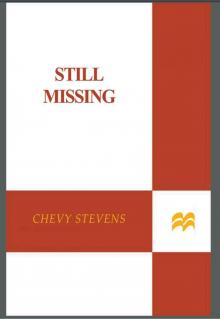 Still Missing
Still Missing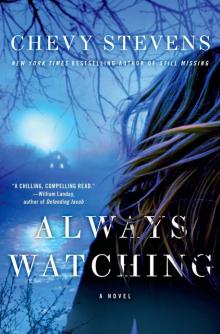 Always Watching
Always Watching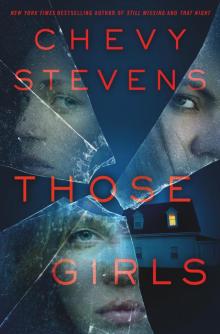 Those Girls
Those Girls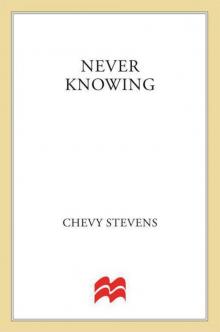 Never Knowing
Never Knowing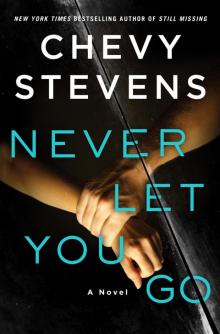 Never Let You Go
Never Let You Go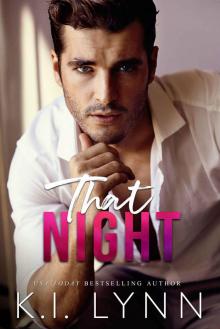 That Night
That Night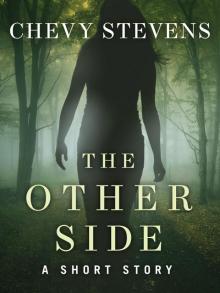 The Other Side
The Other Side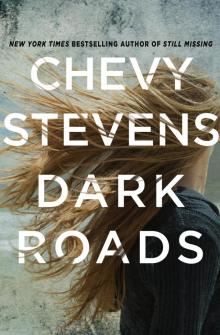 Dark Roads
Dark Roads